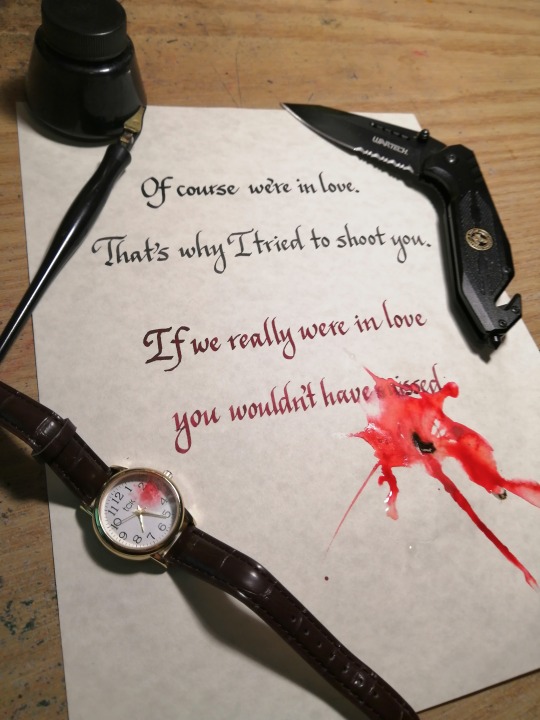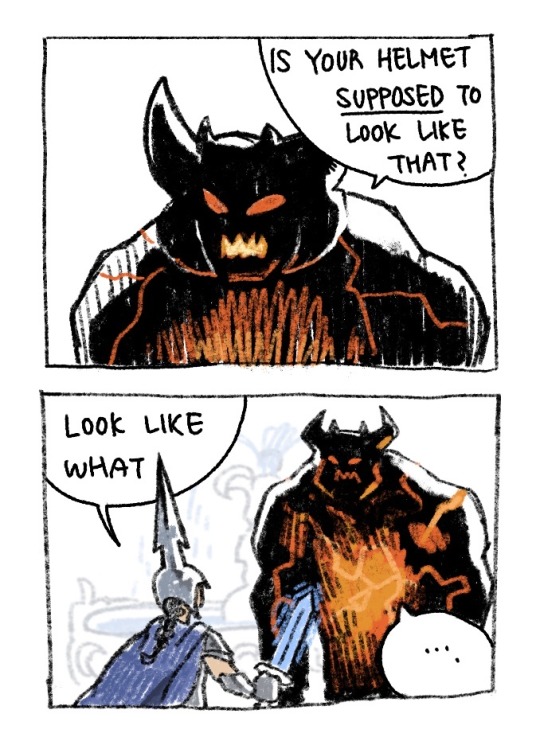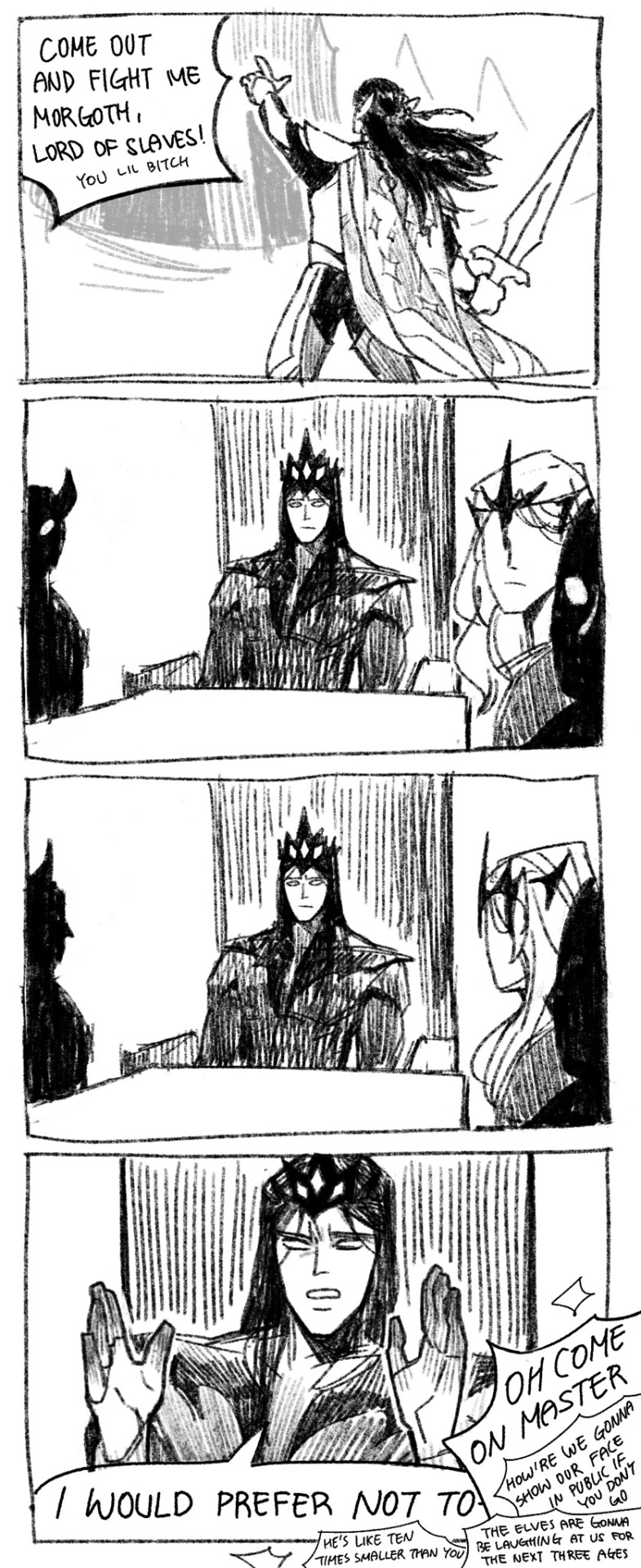Text

roman history is so fucking funny like imagine living somewhere with such a thoroughly fucked up political environment that it starts raining meat and the response from some of your officials is "probably this was made up to stop us from doing reforms"
576 notes
·
View notes
Text

genuinely the funniest thing this monster could’ve said
5K notes
·
View notes
Text
i hate it when i cant even write a poem about something because its too obvious. like in the airbnb i was at i guess it used to be a kids room cause you could see the imprint of one little glow in the dark star that had been missed and painted over in landlord white. like that's a poem already what's the point
355K notes
·
View notes
Text

Drinking horn with gilded copper mounts, Europe, 15th century
from The Hunt Museum, Limerick
14K notes
·
View notes
Text

What if.. Glorfindel joined the Fellowship,,
10K notes
·
View notes
Text
People often say LOTR is a story about hope. (I'm reminded of it because someone said it in the notes of my Faramir post.) And that's true, but it's not the whole picture: LOTR is in large part a story about having to go on in the absence of hope.
Frodo has lost hope, as well as the ability to access any positive emotion, by Return. He is already losing it in Towers: he keeps going through duty and determination and of course Sam's constant help.
For most of the story, Sam is fueled by hope, which is why it's such a huge moment when he finally lets go of the hope of surviving and returning home, and focuses on making it to the Mountain. To speed their way and lighten the load, he throws his beloved pots and pans into a pit, accepting that he will never cook, or eat, again.
When Eowyn kills the Witch King, she's beyond hope and seeking for a glorious death in battle. It's possible that in addition to her love and loyalty for Théoden, she's strengthened by her hopelessness, the fear of the Nazgúl cannot touch someone who's already past despair.
Faramir is his father's son, he doesn't have any more hope of Gondor's victory or survival than Denethor does, he says as much to Frodo. What hope have we? It is long since we had any hope. ... We are a failing people, a springless autumn. He knows he's fighting a losing war and it's killing him. When he rejects the ring, he doesn't do it in the hope that his people can survive without it, he has good reason to believe they cannot. He acts correctly in the absence of hope.
Of course LOTR has a (mostly) happy ending, all the unlikely hopes come true, the characters who have lost hope gain what they didn't even hope for, and everyone is rewarded for their bravery and goodness, so on some level the message is that hope was justified. But the book never chastises characters who lost hope, it was completely reasonable of them to do so. Despair pushed Théoden and Denethor into inaction, pushed Saruman into collaboration, but the characters who despaired and held up under the weight of despair are Tolkien's real heroes.
(In an early draft of Return, Frodo and Sam receive honorary titles in Noldorin: Endurance beyond Hope and Hope Unquenchable, respectively. Then he cut it, probably because it was stating the themes of the entire book way too obviously, because this is what Tolkien cared about, really: enduring beyond hope. Without hope.)
Also, people who know more than me about the concept of estel, feel free to @ me.
11K notes
·
View notes
Text
The most interesting and most important thing about Lord of the Rings is that Frodo fails the quest. He fails the quest, he can’t destroy the ring, he claims the ring for himself, only for it to be taken and accidentally destroyed by Gollum. There are so many ways to interpret that moment!
You can say: evil always defeats itself. The ring destroyed Smeagol, and Gollum destroyed the ring.
You can say: it’s divine providence. Fallible mortals cannot attain grace by their own power. No matter how they try, they will fail unless providence lifts them up. But providence will lift them up. Very Romans 9:16. It depends not upon man’s will or exertion, but upon God’s mercy.
You can say: actions have unpredictable consequences, and here, a series of unrewarded acts of compassion finally gained their reward. There is such a thing as fate, and it is, in its own way, fair. Multiple characters had the chance to kill Gollum, and a good reason to do it too, since he tried to kill them first, and was still a threat. But Bilbo chose to spare him, Frodo chose to spare him, (during the Council of Elrond it’s briefly mentioned that Aragorn and Gandalf and a serious number of elves chose to spare him), and a few minutes before he attacked Frodo, Sam very reluctantly chose to spare him for a final time. If any of them had chosen to kill Gollum, even in reasonable self-defence, he could not have played his part in destroying the ring. But in the decisive moment, the world showed compassion to Frodo as a reflection of the compassion he had shown.
You can say what LeGuin said: Frodo and Gollum are essentially two halves of the same person. Of course the hero can only complete his goal after a violent struggle with himself, only it’s the good half of him that fails, and the evil half that in the end achieves the quest.
You can say: the last time Frodo and Gollum met, Frodo forbade him from ever laying a hand on him, and cursed him to fall into the flames if he tries. The power of the ring, or the power of Frodo wearing the ring, actually caused this to come true. (See this post about Frodo laying a geas.)
What I myself feel and say is this: Gollum thought he was attacking Frodo and taking the ring for himself. What he was actually doing is saving Frodo and saving the world. He saved Frodo from the Ring, from Sauron, from the failure of his quest, from something far worse than mere death. And he’s the only one who could do it: Sam had carried Frodo, he had fought Shelob for Frodo and would gladly die for Frodo, but he could never have hurt him, or taken the ring by force. Gollum could, but only because he didn’t know why he was doing it. He was a sleeper agent of Good. He thought he was attacking Frodo and grabbing the ring for himself, when in fact he was giving his own life, to save his Master whom he loved.
2K notes
·
View notes
Text

Keep scrolling, there's nothing fishy going on here
58K notes
·
View notes
Text
"how to prevent smile lines" there are a thousand more important things to do with your time than postpone evidence of life's joy on your face
59K notes
·
View notes














